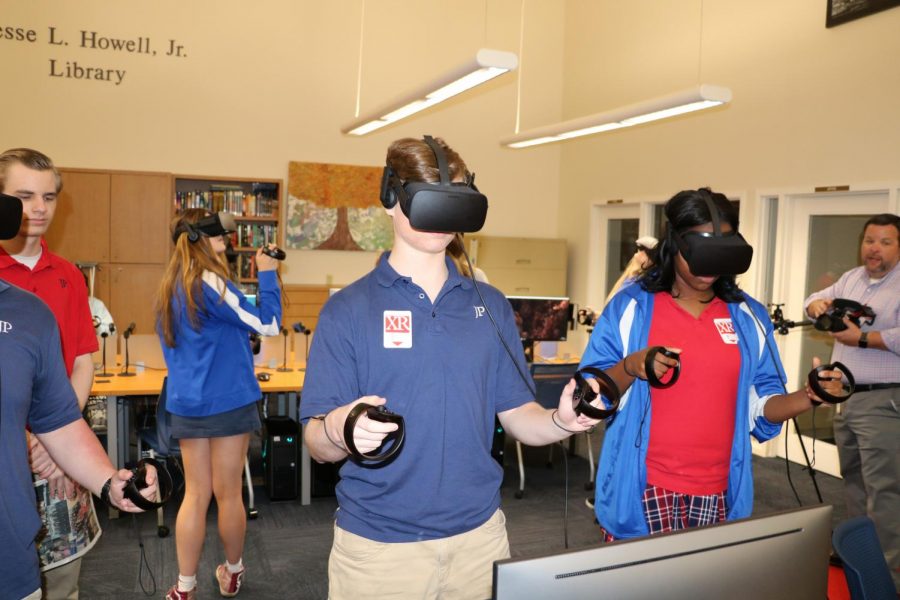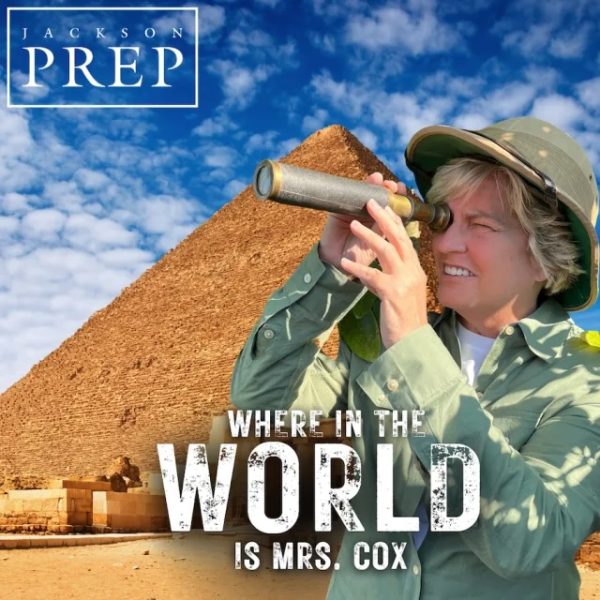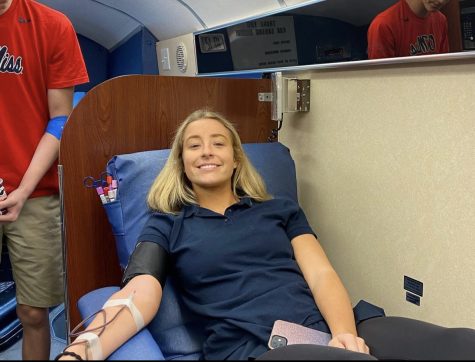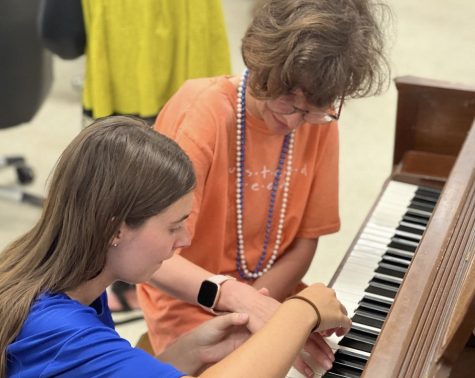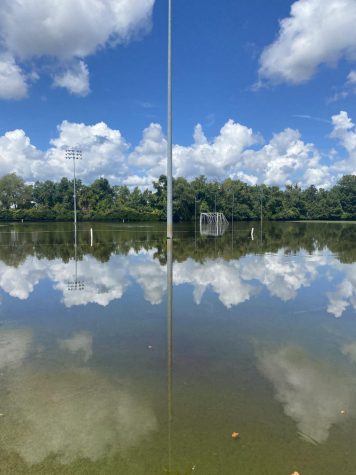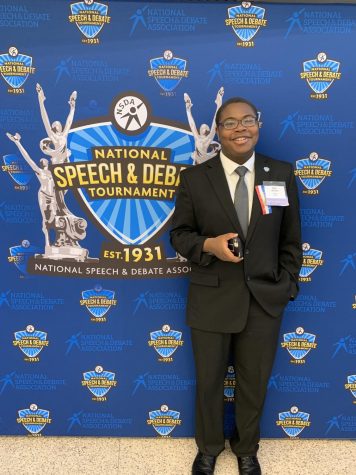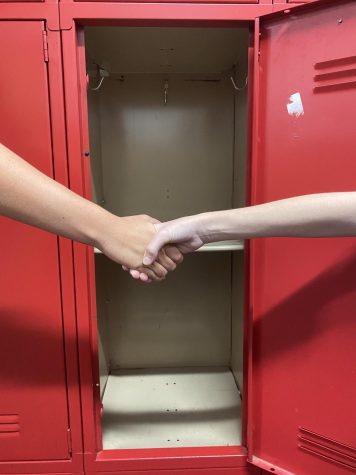Extended Reality Learning Lab debuts in Prep library
Jackson Prep is poised to become a leading school in preparing students for the technology-filled world they are bound to encounter. On Thursday, April 5, the school inaugurated its new Extended Reality (XR) Learning Lab in the Jesse L. Howell library. With an initial installation of 24 virtual-reality stations, the XR Lab will allow students to use state-of-the-art hardware and software for a wide variety of educational purposes. This lab is one of the largest of its kind in any K-12 school in the country.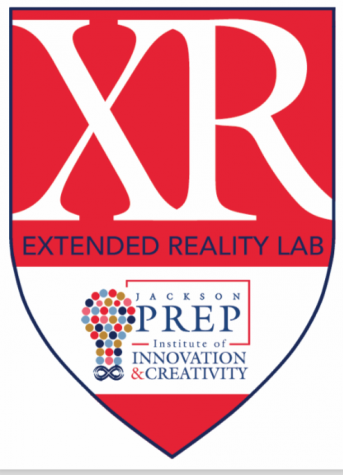
To work the each station, the student puts on a headset that gives them a picture of virtual surroundings. The students are also given hand controllers that enable them to interact with the virtual surroundings. For example, you can point, make a fist, and even grab virtual objects. The current setup utilizes the Oculus Rift headset in conjunction with dedicated Alienware PCs.
One of the many additions to the available electives for students in the 2018-2019 school year will be an extended reality class. This is an exciting new opportunity for students that promises to be very different from the normal high school class setup.
This idea for an extended reality lab and class class came from the strategic plan that Prep has every five years. Mr. Denny Britt, the school’s longtime Chief Operating Officer and current Interim Head of School (Mr. Lawrence Coco will become Head of School on June 1) helped come up with this idea to broaden the horizons of Prep.
Another product from the strategic plan is the Institute of Creativity and Innovation. This is an “umbrella” idea designed to help Prep increase creativity in everyday school life and stay current (or ahead of the curve) with new educational methods. It was instrumental in the formation of the extended reality project.
Earlier this year there were four stations up above the library in the Hederman Media Center before the full setup of the XR Lab. This allowed for a trial run of tests before library space was available.
This year the stations are meant mostly for teachers to get them adjusted to incorporating XR into their everyday lesson plans. For example, geography teachers can use Google Earth VR to give students a 360 degree view of sites around the world. Students can “fly” through cities and landscapes with a sense of actually being there. This app could also be used by History English teachers. So if a student were taking European History, he or she can go on Google Earth VR to look at the building or architecture they are discussing in class. English classes that are studying Shakespeare could go see the Globe theatre on the app to help the students visualize how big the building actually is and imagine themselves going to a performance there.
Students can also visit other places that interest them. Senior Tanner McCraney said, “It was really fun getting to see my house.”
There is also a fascinating Anatomy app where science teachers can guide students through the body’s organs and systems. “Not too long ago, when a student learned about the heart and its functions, they looked at a simple diagram in a textbook,” noted Mr. Britt. “Now, with extended reality, a student can go inside a beating heart, see the valves opening and closing, and learn by experiencing the functions of the heart.”
XR technology provides what education should: immersion. — Mr. Nathan Devine
Within extended reality, the students can view the outside of a healthy organs and one with diseases. For example, with the brain, the student can see the outside of a brain and then view the neurons firing from the inside. It is an amazing experience that would be difficult to do any other way. This interactive extended reality anatomy picture and others like it will help the students visualize the lessons.
Hundreds of other educational extended-reality apps are currently becoming available, and one of the functions of the XR Lab will be to help teachers and students find the best software experiences available for their particular educational goals.
English teacher Mr. Nathan Devine said, “XR technology provides what education should: immersion. At Prep, students engage and make unique products. In the past, that might have been accomplished by handing someone a paintbrush, but XR is the next generation of learning–it’s handing a paintbrush to the mind.”
The XR Lab sits between the librarians’ desk and the main bookshelves in the library, in an area once home to general-use computers (since most Prep students now bring their own devices, these computers were no longer being used as much as they once were).
Next to the stations there is a dedicated laptop where teachers can observe what the students are working on. Director of Instructional Technology Ms. Laurie Van Pelt said, “The teacher laptop is really awesome because it allows teachers to interact with their students in the same virtual space.” This shared space is an app called Infinite Whiteboard. This allows students to be in a virtual classroom with the teacher. It is password protected, which ensures the class’s privacy. Using that same computer, the teacher can also monitor the student’s progress in the apps.”
Next year the stations will be for the extended reality class and for other courses where extended reality will improve their understanding of the lessons. In the XR class, students will learn how to operate the stations and by the end of the year, be able to make their own virtual experience.
Classes that come to the extended reality Lab will also be assisted by student lab assistants. During the summer, Prep will be hosting summer camps that are solely for learning how to use extended reality.
Many people believe that this technology will be a big part of this generation, and it already is. For example, UPS is using extended reality to train workers before they work on the actual conveyor belts that make UPS run. This could drastically change medical school, dental school, and other graduate schools that require a lot of expertise. Doctors performing their first surgery would not be as nervous if they had performed that surgery on a virtual patient many times before.
The school hopes the extended reality class and the XR Lab wil offer an amazing opportunity to broaden Prep’s horizons. Ms. Norma Cox, Prep’s librarian and Extended Reality Learning Lab Director said, “Educators are seeing increased engagement levels and improved test scores across the board with extended reality education programs.”



